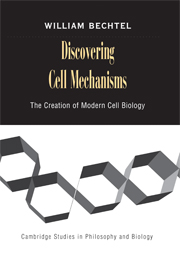Book contents
- Frontmatter
- Contents
- Preface
- 1 Introduction: Cell Mechanisms and Cell Biology
- 2 Explaining Cellular Phenomena through Mechanisms
- 3 The Locus of Cell Mechanisms: Terra Incognita between Cytology and Biochemistry
- 4 Creating New Instruments and Research Techniques for Discovering Cell Mechanisms
- 5 Entering the Terra Incognita between Biochemistry and Cytology: Putting New Research Tools to Work in the 1940s
- 6 New Knowledge: The Mechanisms of the Cytoplasm
- 7 Giving Cell Biology an Institutional Identity
- Afterword
- References
- Index
2 - Explaining Cellular Phenomena through Mechanisms
Published online by Cambridge University Press: 05 June 2012
- Frontmatter
- Contents
- Preface
- 1 Introduction: Cell Mechanisms and Cell Biology
- 2 Explaining Cellular Phenomena through Mechanisms
- 3 The Locus of Cell Mechanisms: Terra Incognita between Cytology and Biochemistry
- 4 Creating New Instruments and Research Techniques for Discovering Cell Mechanisms
- 5 Entering the Terra Incognita between Biochemistry and Cytology: Putting New Research Tools to Work in the 1940s
- 6 New Knowledge: The Mechanisms of the Cytoplasm
- 7 Giving Cell Biology an Institutional Identity
- Afterword
- References
- Index
Summary
I do not in the least mean by this that our faith in mechanistic methods and conceptions is shaken. It is by following precisely these methods and conceptions that observation and experiment are every day enlarging our knowledge of colloidal systems, lifeless and living. Who will set a limit to their future progress? But I am not speaking of tomorrow but of today; and the mechanist should not deceive himself in regard to the magnitude of the task that still lies before him. Perhaps, indeed, a day may come (and here I use the words of Professor Troland) when we may be able ‘to show how in accordance with recognized principles of physics a complex of specific, autocatalytic, colloidal particles in the germ cell can engineer the construction of a vertebrate organism’; but assuredly that day is not yet within sight of our most powerful telescopes. Shall we then join hands with the neovitalists in referring the unifying and regulatory principle to the operation of an unknown power, a directive force, an archaeus, an entelechy, or a soul? Yes, if we are ready to abandon the problem and have done with it once and for all. No, a thousand times, if we hope really to advance our understanding of the living organism.
(Wilson, 1923, p. 46)The focus of this book is creation of cell biology in the mid-twentieth century as a distinct field of biology devoted to discovering and understanding the mechanisms that account for the ability of cells to live.
- Type
- Chapter
- Information
- Discovering Cell MechanismsThe Creation of Modern Cell Biology, pp. 19 - 63Publisher: Cambridge University PressPrint publication year: 2005



